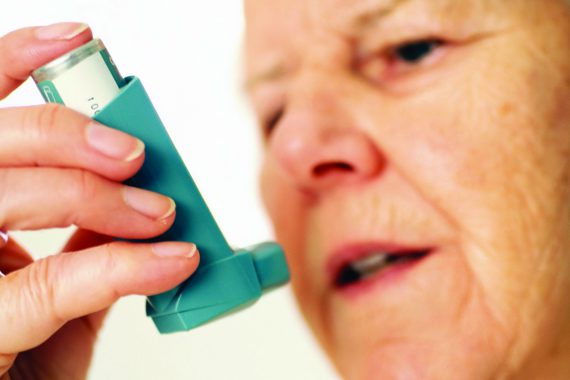NICE publishes rapid Covid-19 guideline for severe asthma

NICE has published rapid guidelines on the treatment of patients with severe asthma during the coronavirus (Covid-19) pandemic.
Patients with asthma have been advised to take extra care during the pandemic, as the respiratory condition is a risk factor for developing more serious symptoms from Covid-19.
Some are among the 1.5m patients who have received a letter advising them to ‘shield’ themselves for three months.
The new guidance, published this weekend, defines ‘severe’ as asthma which ‘requires treatment with high-dose inhaled corticosteroids plus a second controller (and/or systemic corticosteroids) to prevent it from becoming “uncontrolled”, or which remains “uncontrolled” despite this therapy’.
It says:
- GPs should communicate with these patients and their families to relieve their anxiety during the pandemic.
- GPs should tell patients to continue taking their treatment as prescribed to keep their asthma ‘as stable as possible’, including if they have or are suspected to have coronavirus, the guidance said.
- GPs should also reassure patients that there is ‘no evidence that inhaled corticosteroids increase the risk of getting Covid‑19’.
- The guidance says that face-to-face contact with these patients should be minimised and they should be asked to attend appointments alone or with one other person ‘to reduce the risk of contracting or spreading the infection’.
- Patients with severe asthma who have received a letter from the Government telling them they are at high risk of complications arising from Covid-19 should be advised to ‘shield’, it added.
- It says clinicians should ‘only carry out bronchoscopy and most pulmonary function tests for urgent cases and if the results will have a direct impact on patient care, because these tests have the potential to spread Covid-19’
- GPs should advise patients to ‘regularly’ clean equipment such as face masks and mouth pieces using a detergent and ensure they do not share their inhalers or devices with others.
- And they were urged not to prescribe asthma medicines for more than 30 days’ treatment to avoid causing shortages.
The guidance said: ‘Prescribe enough asthma medicines to meet the patient’s clinical needs for no more than 30 days’ treatment. For inhalers this depends on the type of inhaler and the number of doses in the inhaler. Prescribing larger quantities of asthma medicines puts the supply chain at risk.’
It comes as GPs were asked by NHS England to review patients who have self-identified as needing to shield from this week – as health service bosses admitted that many patients at the highest risk of coronavirus have still not yet received a letter from NHS England notifying them to shield themselves.
NICE also published three other ‘rapid’ guidelines on managing patients with suspected or confirmed viral pneumonia and those with Covid-19 who also have rheumatological autoimmune, inflammatory and metabolic bone disorders, as well as managing coronavirus symptoms in the community.
Highlights from NICE’s new Covid-19 rapid guideline on severe asthma
- Communicate with patients, their families and carers, and support their mental wellbeing, signposting to charities (such as the British Thoracic Society, Asthma UK, and the British Lung Foundation) to help alleviate any anxiety and fear they may have about COVID‑19.
- Be aware that severe asthma is defined by the European Respiratory Society and American Thoracic Society as asthma that requires treatment with high-dose inhaled corticosteroids (see inhaled corticosteroid doses for NICE’s asthma guideline) plus a second controller (and/or systemic corticosteroids) to prevent it from becoming ‘uncontrolled’, or which remains ‘uncontrolled’ despite this therapy.
- Some patients with severe asthma will have received a letter telling them they are at high risk of severe illness from COVID‑19. Tell them, or their parent or carer, to follow the advice on shielding in UK government advice on shielding and protecting people defined on medical grounds as extremely vulnerable to COVID-19.
- Tell all patients, or their parent or carer, to continue taking their regular medicines in line with their personalised asthma action plan. This includes those with COVID‑19, or suspected of having it. This is because it’s important that they make sure their asthma is as stable as possible. Ensure their action plan is up to date.
- Minimise face-to-face contact.
- Only carry out bronchoscopy and most pulmonary function tests for urgent cases and if the results will have a direct impact on patient care, because these tests have the potential to spread COVID‑19. Find out more from NHS England’s clinical guide for the management of respiratory patients during the coronavirus pandemic.
Source: NICE
Visit Pulse Reference for details on 140 symptoms, including easily searchable symptoms and categories, offering you a free platform to check symptoms and receive potential diagnoses during consultations.









